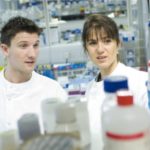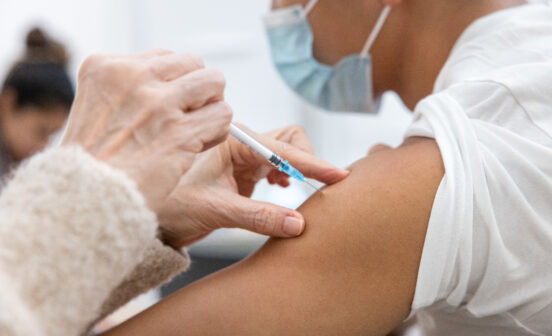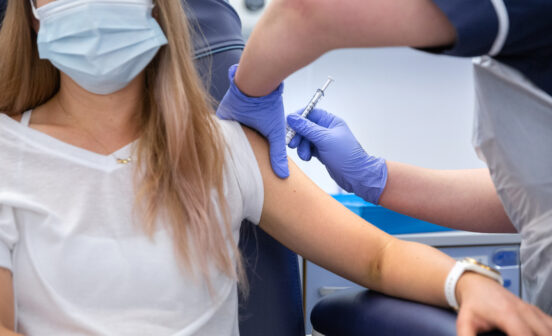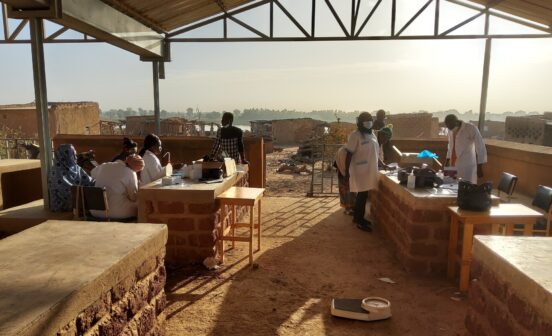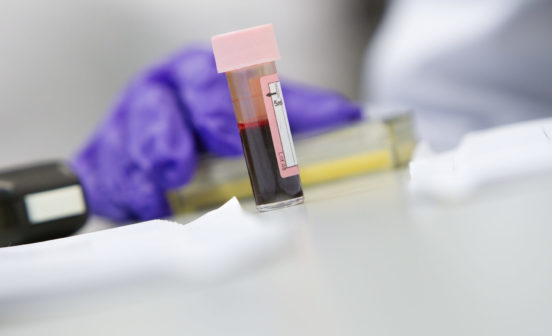Our theme focuses on tackling the high burden of infectious diseases by prioritising:
- Prevention and Vaccination
- Diagnostics and Digital Health
- Therapeutic approaches and precision medicine.
If you are a patient or member of the public interested in understanding what research we are supporting, please read our research pages for patients/public for summaries categorised by disease area.
Why is this Research Needed
North-west London has substantial social inequality and an ethnically diverse population. The area has long been associated with a high burden of infectious diseases, but this came into sharp focus with the high mortality from COVID-19. Engagement with the local community and patient groups prior to COVID-19 identified antimicrobial resistance (AMR), HIV and pandemic preparedness as research priorities to safeguard and protect the health of the Northwest London population and beyond.
Theme Aims
- To develop improved approaches to preventing infection (potentially supported by human challenge studies)
- To identify new diagnostic markers to determine viral/bacterial infection and novel means for rapid diagnosis
- To evaluate the impact of rapid diagnostics on clinical pathways
- To identify novel therapeutic agents and better ways to use existing therapeutics
Upcoming /Ongoing Projects within the Theme
Novel prevention and vaccination strategies
Investigators are working on the next generation of vaccines, particularly RNA-based technologies including self-amplifying RNA. Theme members work closely with colleagues in bioengineering to develop new methodologies for delivery and with industrial partners on Phase I/II studies. Aligned with this, the discovery of monoclonal antibodies for both diagnostics and therapeutics is embedded in the theme, focussed particularly on bacterial infection.
Work on vaccine development is supported by controlled human infection models (CHIM). Local investigators have a long track record in respiratory virus challenge work (influenza, rhinovirus, RSV) and led the first human challenge studies with SARS-CoV2. In partnership with Imperial College NHS Trust and Chelsea and Westminster NHS Foundation Trust, this programme continues with a wider capacity for human challenges including malaria and salmonella infections.
Diagnostics and digital health
Theme investigators have led the discovery of new diagnostic markers to support the management of patients with a fever (both adults and children). Novel gene expression and metabolic markers are being developed as diagnostics in collaboration with industrial partners. During the COVID-19 pandemic, investigators led the clinical development of COVIDnudge, a novel point-of-care diagnostic rolled out across the NHS. Translation of new tests to the NHS is supported by the Colebrook Laboratory and the Molecular Diagnostics Unit.
Digital support tools and altering are an area of major focus, investigators continue to evaluate tools for prompt detection and management of sepsis, and selection of antimicrobials, working closely with the BRC Digital Health Theme.
In partnership with the NHS, the BRC Igenios Clinic provides a service for children and young adults with severe infection to identify rare genetic variants that might offer insight into disease susceptibility and guide future management.
Novel therapeutic approaches and precision medicine
Investigators are developing and evaluating novel therapies that offer potential curative therapy for chronic viral infection (particularly HIV, HTLV and hepatitis C). Trials of neutralising antibody therapy are underway and novel cellular therapeutics are in development (for example iNKT cellular therapy). Trials are also underway for novel monoclonal therapy that might prevent the emergence of malignancy in patients living with HTLV.
The theme supports studies that evaluate the optimum way to use existing antimicrobials. The Centre for antimicrobial optimisation explores the optimum dosing, particularly of antibacterials while the theme supports the development of platform therapeutic trials, including REMAPCAP-flu, to evaluate different treatments for patients admitted to hospitals with influenza.
Patient and Public Involvement, Engagement and Participation
Our theme research priorities were established through engagement with local community and patient groups. Research projects within our theme are committed to raising public awareness, delivering educational content and actively surveying the public and research participants for feedback. Our community partners will also provide critical feedback on research projects and lay summaries, and ensure that the research is beneficial to the public.
At the management level, our community partners with lived experience will help guide our theme’s strategy by contributing to the theme steering committee meetings. We also work closely with the BRC Patient Experience Research Centre to coordinate PPIEP activities.
Lay Summaries of 2023 Funded Pilot Projects
Within-host evolution of H3N2 influenza A virus after human challenge and the impact on viral fitness and clinical outcomes (PI: Anika Singanayagam)
Influenza (“flu) is a viral infection that causes epidemics each winter putting significant pressure on the NHS, and can also cause global pandemics. Influenza is known to change (mutate) very quickly as it replicates within a person. However, there has been limited study of how the flu virus changes in an infected person because most infections are mild and short-lived, and so it is challenging to identify and sample people from the early stages of their infection.
In this research project, we intend to undertake a detailed investigation of how the genome of the influenza virus changes (mutates) during the course of an infection in a person (by deep sequencing the virus). To do this, we will be using samples from a human challenge study of influenza (a study in which volunteers are intentionally infected in order to study the disease). Human challenge studies are an excellent way of studying infection as we know exactly when the infection occurs and can collect early and detailed sampling from volunteers. This allows us to study infection in ways that cannot be easily done through a real-world study. We plan to correlate the sequencing results with existing data about symptoms and immune responses that we have obtained from each volunteer. We will study any interesting mutations we find in the laboratory and compare the data with some earlier pilot work from a different study. We know (from our pilot work) that the way the challenge virus is grown in the laboratory can introduce mutations that can affect what happens during an infection. We anticipate that this study will be valuable in progressing human challenge models, including for future uses of the model to study transmission of the virus and the effects of antiviral drugs and vaccines.
Investigating the clinical value of Next Generation Sequencing for minority species detection in patients suspected to have sepsis. (PI: Anjna Badhan)
Sepsis is a life-threatening condition. It occurs when the body’s vital organs stop functioning normally due to a severe infection. Approximately 30% of patients with sepsis die despite this intensive care whilst often those that do survive are left with complications that can be life-changing. Consequently, it is important to treat sepsis as fast as possible as the health of a patient may worsen dramatically in a matter of hours, decreasing their chances of survival. Therefore, currently, any patient who is thought to have sepsis will be given an antibiotic that can target many infection-causing microbes, termed a broad-spectrum antibiotic. These may not always work and can sometimes cause further complications. Moving to more specific antibiotics is desirable, both to better treat the infection and reduce the overuse of antibiotics which contributes to the emergence of antibiotic resistance – a global and local problem. However, these decisions can only made once the bug has been identified and this can take several days.
Recently, two-step laboratory tests have been developed that can first detect, within a few hours, direct evidence of blood infection. In the second step, usually overnight, the organism, a bacterium or a fungus, is identified by its genetic code. This is called sequencing. This helps select, within a couple of days, the best antibiotics for the patient.
The current sequencing test will identify one organism. In this project, we aim to test the next generation of sequencing to see whether additional infections, at low levels, are missed. In the Molecular Diagnostic Unit (MDU) we have research samples from patients already treated for sepsis that would allow us to investigate whether the detection of the low-level bacterial or fungal infection detected by next-generation sequencing will have a positive impact on treating patients with sepsis.
A UK cohort of acute hepatitis C infection to support human challenge studies (PI: Graham Cooke)
Hepatitis C is a viral infection that causes a major burden of liver disease in the UK and beyond. The main complications of infection are liver cancer (known as hepatocellular carcinoma, HCC) and liver scarring (known as cirrhosis which leads to liver failure and may need liver transplantation).
Curative hepatitis C treatment is now widely available in the UK (though access is still very limited throughout the world). For patients cured, the risk of long-term complications is reduced and life expectancy is greatly improved.
This change in treatment has led to WHO targets for the elimination of hepatitis C throughout the world. This is theoretically achievable, but ongoing infection (including those previously cured) is a challenge to reaching these targets. No vaccine exists, and one of the barriers to developing one is the lack of a practical way to carry out trials to test it.
The proposed work will underpin the development of a safe means to infect healthy people with hepatitis C and use this to test vaccines. Imperial College has a strong track record in such studies and the detailed evaluation of risk and benefits that is required. The first stage in development is to isolate an infectious virus that can safely given to other patients and this will require access to patients through an established cohort in the UK (UKACH). The modest resource requested is to sustain this cohort whilst further funding is sought.
Transcriptomic and Immunological signatures associated with Neurodevelopmental and hearing outcomes in Infants with Congenital Cytomegalovirus. (Acronym = TINI-CC) (PI: Helen Payne)
Cytomegalovirus (CMV) is the leading cause of neurodevelopmental and hearing impairment from congenital infection and contributes to 10% of cerebral palsy and 25% of childhood deafness. Despite this, CMV is relatively unheard of by the general public and research to improve diagnostics and treatment options is poorly funded.
Cytomegalovirus is a common virus typically causing mild illness in healthy individuals, although foetal infection can cause severe neurological disease and hearing loss. Worldwide 0.6% of infants have congenital CMV (cCMV), however only 10-15% have severe disease at birth, and up to 20% have late-onset manifestations. Affected infants require antiviral treatment to be initiated within 28 days of life to prevent poor neurodevelopmental outcomes, progressive and late-onset hearing loss. However, without universal screening for cCMV an estimated 75% of affected infants have delayed or missed diagnoses due to non-specific signs and symptoms, and therefore delayed or missed treatment.
If funded, our study (named TINI-CC) will be a national expansion of an existing pilot study at Imperial. Preliminary data suggests infants with low or absent immune responses to CMV have more severe disease manifestations. In addition, recent research suggests certain gene signatures may be predictive of hearing loss in infants with cCMV. We aim to further the understanding of why some infants are more severely affected by CMV than others and identify biological markers that can predict which infants will have long-term and late-onset sequelae, and therefore likely benefit from early antiviral treatment. With such information, clinicians could identify infants who require treatment, thereby endorsing early infant universal screening for cCMV, leading to more timely diagnosis and treatment initiation, and ultimately improved clinical outcomes for affected infants. It would also minimise unnecessary treatment, and reduce the anxiety families face associated with prognostic uncertainty.
Investigating drug resistance mutations in proviral HIV DNA in people receiving long-acting injectable antiretroviral treatment (PI: Jasmini Alagaratnam)
HIV disease is treatable but lifelong treatment is needed. Most HIV treatments involve daily medication, but cabotegravir and rilpivirine (CAB/RPV) injections given every two months have recently been approved to treat people who have undetectable levels of free virus on blood tests, who have never had a rise in virus levels while taking HIV treatments and who do not have evidence that cabotegravir or rilpivirine may not work. HIV treatment by injection is popular because it means individuals do not need to take medication daily.
Testing for HIV drug resistance in free virus from blood samples before someone starts HIV treatment or when someone has a rising virus level while taking HIV treatment is used to decide future treatment options. Some people do not have HIV drug resistance test results; either it was never performed, or the test results are not available. However, once a person is on HIV treatment, and they do not have detectable levels of free virus in their blood, it is no longer possible to perform the standard HIV drug resistance test and these individuals are not eligible to receive CAB/RPV injection treatment, which unfairly limits their access to the full range of HIV treatments.
Using a new technique, we aim to investigate drug resistance mutation patterns in HIV genetic material in resting immune system cells among people receiving CAB/RPV injection treatment. If these individuals show no evidence of drug resistance mutations hidden in their resting immune system cells, then this method could be used to inform eligibility for CAB/RPV HIV injection treatment in people who do not otherwise have standard HIV drug resistance test results.
A new test for bacterial and viral infection based on host-response: HOst Transcript SPot Optical Test (HOTSPOT) (PI: Jethro Herberg)
A large proportion of antibiotics that are prescribed for children are unnecessary, as most infections are caused by viruses which antibiotics cannot treat. The overuse of antibiotics leads to antibiotic resistance in bacteria, and we often see patients with bacterial infections that are difficult to treat with standard antibiotics. Antibiotic-resistant infections are increasing and could be the leading cause of death by 2050.
Many children with symptoms of an infection are given antibiotics as a precautionary measure, as it is unclear whether their symptoms are caused by bacteria or viruses. Our currently available diagnostic tests do not confidently separate patients with bacterial or viral infections. Most tests are designed to detect bacteria or viruses that may be the cause – however, even if one is detected, it is often unclear whether it is the cause of illness, as our bodies are covered in viruses and bacteria even when we are well. A quick test that discriminates illness caused by bacteria or viruses, which can be carried out within a doctor’s office, pharmacy, hospital emergency room or ward is desperately needed.
Scientists have discovered that when we fight infections, our bodies switch on or off different genes and that these genes vary depending on the type of infection. We can measure these genes as a way of finding out whether a patient has a bacterial or a viral infection. We are developing a new type of test that can tell apart bacterial and viral infections by measuring genes in a drop of blood. We are using lateral flow tests, as these are cheap and easy to use. This grant will allow us to increase the number of biomarkers we can detect on one lateral flow strip, to include bacterial infection.
Development of a real-time PCR assay for the detection of Salmonella Typhimurium bloodstream infection (PI: Malick Gibani)
Salmonella infections, especially a type called Invasive Non-Typhoidal Salmonella (iNTS), can cause serious disease globally, especially in the wider sub-Saharan African region. These infections are also becoming resistant to antibiotics, making them even more challenging to treat. It is hoped that new vaccines will go some way to providing protection, but testing these vaccines in affected areas is difficult.
We have received funding for a project called CHANTS, where we use a controlled method to infect healthy people with a specific type of Salmonella under close medical supervision, to mimic what happens in real infections. We want to see how well potential vaccines work against Salmonella. To do this, we need to know if the Salmonella is present in their blood.
Currently, we use a method called automated blood culture to find the Salmonella in the blood, but it’s not perfect. It can miss the infection in some cases because Salmonella is only present in the blood at low levels and can hide inside cells. We want to improve this by developing a new method called culture-based PCR. This method helps us find Salmonella in the blood samples by enriching them before performing a test for Salmonella DNA called a PCR. We’ve used this method successfully before to find other types of Salmonella.
Our goal is to make this new method work for detecting Salmonella Typhimurium in blood, a dangerous type of Salmonella that causes serious infections. If successful, this method would allow us to make the diagnosis of Salmonella infection more quickly, leading to better outcomes. By improving our ability to find Salmonella in the blood, this method could have the added benefit of making vaccine testing more accurate and faster. This means we can develop vaccines that protect us better against these dangerous infections and help save lives.
BReath ANalysis in CHildren (BRANCH): pilot study of expired breath analysis to distinguish viral from bacterial infection in ventilated children (PI: Rebecca Mitting)
Each year, nearly 7000 children need to be put on a ventilator for a chest infection. Most commonly these infections are caused by viruses (which do not need antibiotic treatment) but since it is difficult to be sure of this, doctors often start antibiotics in case the infection is caused by bacteria.
Unnecessary use of antibiotics is a problem because it can lead to resistance, which might make medicines less effective in the future, as well as cause side effects for the child. We currently do not have a test for a bacterial chest infection that is accurate and gives immediate results.
Previous research has shown that patterns of chemicals (VOCs) detected in the breath of sick children can be used to identify the type of infection. However, this test has never been performed on children on a ventilator. In this research study, we will assess whether it is possible to collect and analyse expired breath from the ventilator tubing into which the children breathe out. We expect that the pattern of VOCs detected will be different in bacterial and viral infections.
To do this, we have put together a diverse team with expertise in children’s intensive care, breath analysis and statistics who will collect breath samples from 55 children in Children’s Intensive Care at St Mary’s Hospital and analyse them at a specialist laboratory at Hammersmith Hospital.
If this pilot study shows that we can collect and analyse expired breath and that the VOCs collected are different in viral and bacterial infection this will pave the way for a larger study. We hope that this will provide a rapid, painless, safe test, which will enable staff to stop antibiotics quickly, saving money and reducing the risk of side effects.
HuMab-H5 study: An Experimental Medicine study designed to isolate human monoclonal antibodies to H5 (clade 2.3.4.4b) hemagglutinin following RNA vaccination (PI: Robin Shattock)
Highly virulent avian influenza viruses are circulating at unprecedentedly high levels in wild and domestic birds. Only a few mutations are required to enable adaptation for human-to-human transmission triggering the very real threat of a human “Bird-flu” pandemic. Human monoclonal antibodies offer the potential to treat severe infections and protect those with suppressed immune systems that would not benefit from vaccination. Indeed, monoclonal antibodies against the COVID-19 virus were highly effective in treating individuals in the early phase of the pandemic and protecting those with impaired immunity. However, monoclonal antibodies are usually isolated from infected individuals once an outbreak has occurred leading to a significant delay before they can be manufactured and deployed. To pre-empt a possible human “Bird-flu” pandemic we seek to utilise the clear potential of RNA vaccines to elicit protective antibodies to a human transmissible version of the spike glycoprotein of avian (H5) influenza. In a small clinical study, we will immunize five subjects with an mRNA vaccine encoding the mutated spike protein predicted to have the potential to cause a human outbreak and isolate antibody-producing cells specific for the spike glycoprotein from their blood. These cells will be used to generate monoclonal antibodies with high potency to neutralise the virus. This will provide an important therapeutic strategy, facilitating monoclonal manufacture ahead of a potential human “bird-flu” outbreak. Our research will also provide proof-of-concept that this strategy could be more widely adopted to generate therapeutic monoclonal antibodies against any predicted pathogen with the potential to cause future pandemics.
Lay Summaries of 2024 Funded Pilot Projects
Feasibility study for introducing real time genomics for AMR in the diagnostic lab setting (PI: Anna Morkowska)
Antimicrobial resistance (AMR) is a major concern in the healthcare setting, with an estimated 1.14million deaths/year currently attributed to AMR, and predicted to be 10 million deaths/year worldwide by 2050. Multidrug resistant organisms can develop amongst our healthy gut bacteria, if we take multiple antibiotic courses, or have long hospital stays. The most concerning type are Carbapenemase producing enterobacterales (CPE) – bacteria resistant to our last resort antibiotics (called carbapenems), which are known to spread in hospital settings and have a negative impact on patient outcomes. Studying the bacterial DNA (whole genome sequencing (WGS)) is an established method for comparing bacterial strains from different patients to see how similar they are and how they are spreading around hospitals or the community. This can identify outbreaks and hospital infection prevention and control (IPC) practitioners can use this information to take action, to control further AMR spread and try to identify the cause of the outbreak to prevent more patients getting sick.
Currently these DNA analyses take months to perform by external reference laboratories and are too expensive and technically complex for the routine hospital lab setting. Further, the complex results are often difficult to understand for non-specialist NHS staff.
This project aims to see if it is possible to perform WGS in the hospital diagnostic laboratory and produce reports that are easy to interpret by non-specialist staff within a 2-week timescale that would result in preventative actions. This would provide the basis of larger future studies to assess the impact of this intervention on the spread of AMR around our hospitals.
Improving treatments for Bacterial Vaginosis, the right drugs for the right bugs (PI: Charlotte-Eve Short)
Bacterial vaginosis (BV) is an intimate health condition affecting up to 1 in 3 women/year. It can cause vaginal discharge, irritation and an unpleasant smell that can make women self-conscious. BV is caused by overgrowth of ‘non optimal’ bugs (bacteria) in the vagina. Current drugs (antibiotics) used to treat BV don’t work very well, with half of women experiencing another episode within 6 months and many receiving repeated antibiotic courses.
It has serious consequences, increasing risk of sexually transmitted infections like HIV, infertility, preterm birth. Conversely, ‘optimal’ vaginal bacteria (lactobacilli) can protect against these conditions.
Until recently our understanding of BV was limited due to ‘non optimal’ vaginal bacteria being difficult to grow and study. Newer DNA techniques have enabled us to scrutinise the many bacteria (species) that cause BV. We believe women with difficult to treat (recurrent) BV have vaginal bacteria that can escape the impact of antibiotics (resistance).
We propose to use extremely sensitive DNA techniques (full genome metagenomic sequencing) to understand which bacteria are causing BV in our local women in Northwest London and which have antibiotic resistance. These techniques also give us information other organisms like fungi that may have a role.
The wider aim of this work is to select better BV treatments to use and test in women of Northwest London. One strategy of interest is a two-step approach, to remove the ‘non optimal’ bacteria and to replace them with protective ‘optimal bacteria’. It would be ideal to use treatments without any known resistance.
This work will support evidence based clinical guidelines and reduce unnecessary antibiotic use. Ultimately, we can use these types of DNA data, alongside clinical data, to build tools and tests that can help tailorize treatments for individual women.
Improving access to prognostic tests for carriers of the virus HTLV-1 (PI: Lucy Cook)
Human T-cell lymphotropic virus type 1 (HTLV-1) is a blood-borne virus that is relatively rare in the UK (estimated 35,000 people). The virus is usually spread sexually or from mother to child via pregnancy/breast feeding. It is more common in other parts of the world, and the majority of people living with HTLV-1 locally are of Caribbean heritage. Most people living with HTLV-1 remain healthy, but a small proportion can develop some devastating complications. One is a blood cancer (known as adult T-cell leukaemia/lymphoma, ATLL), and the other is a condition that causes debilitating inflammation of the spinal cord (known as HTLV associated myelopathy, HAM).
HTLV-1 has low profile in the UK – is not screened in sexual health clinics, and pregnant woman are not tested. This project is focused on overcoming some of the practical challenges in HTLV-1 prognostic testing (identifying patients at risk of ATLL and HAM).
Imperial runs an accredited laboratory that does all HTLV-1 prognostic testing in the UK. Current lab protocols are complicated, and require samples to be fresh, and some have to be rejected when they arrive because there have been delays in shipping.
We have been piloting different ways of collecting blood samples such as using dried blood spot cards, where only drops of blood are needed, left to dry and then just posted. In this project, we want to see whether these new tests are just as good for diagnosing HTLV-1 infection, as well as identifying which patients are at risk of future cancer or inflammation. We aim to develop testing methods that could be adopted in the UK and to also share our new protocols with international partners working in resource poor regions.
AI for Diagnosing Children’s Fevers – using AI tools to enable bacterial infection diagnosis in children quickly and accurately (PI: Myrsini Kaforou)
Fever is one of the most common presenting symptoms for children in the accident and emergency department. Bacterial infection, which can in some cases become very serious and even fatal, is one cause of fever. These children need quick treatment with antibiotics, but we still struggle to confirm cases of bacterial infection quickly, because currently we must wait for the bacteria to grow from the child’s sample, which can take many days. Our project will be addressing this, by improving a new test able to confidently identify if a child is fighting a bacterial infection from a blood sample in a point-of-care setting. In this project we will be using artificial intelligence (AI) tools to improve this quick, 45-minute test even further by increasing the number of bacterial infection types we can use to develop the test and incorporating them in a way that only improves the test further. Until now, we have been developing our blood test with a narrowed range of bacterial infections which we are extremely confident about (~800 patients). Our new AI approach will include a wider group of infections into the development. This means that the test will be able to work for a larger range of infections, increasing the number of pathogens it can be used for reliably, and improving its accuracy. Using tailor made AI methods, we will be able to learn from over 2000+ cases of infection in children with fever in a more inclusive manner. This project is critical for continuing to develop our revolutionary diagnostic approach to bring it closer to a reality, as we need to ensure that it would perform well for a wide variety of infections.
Fingerprinting Pathogens for Rapid Infection Diagnosis (PI: Rachel Lai)
Infections are a major reason for Emergency Department visits and hospital stays worldwide. In the UK there are over 1.2 million cases each year, but many of these infections remain unconfirmed, leaving doctors to prescribe general treatments based on symptoms. Without knowing the exact cause (identity of the pathogens), this can lead to repeated hospital or GP visit, prolonged hospital stays, unnecessary antibiotic use, and even worsened patient outcomes. While current diagnostic methods, such as PCR and MALDI-TOF mass spectrometry, can identify some pathogens, each has limitations, including long preparation times, the need to extract DNA, and difficulty in detecting hard-to-grow microorganisms.
Our project aims to address these challenges by using a new technology called Laser Desorption Rapid Evaporative Ionisation Mass Spectrometry (LD-REIMS). Unlike conventional methods, LD-REIMS can analyse samples directly without needing lengthy preparations or culturing, producing fast and reliable results at a lower cost. Our primary goal is to establish a database of unique chemical “fingerprints” for different bacteria and fungi. This will allow LD-REIMS to rapidly recognise these pathogens in blood plasma samples and other body fluids.
To test its effectiveness, we will compare LD-REIMS results with those from the standard MALDI-TOF method, focusing on speed, accuracy, and range of detectable pathogens. If successful, this technology could streamline the process of infection diagnosis, helping clinicians to quickly identify infections and tailor treatments specifically to the pathogens involved. By enabling faster, more accurate diagnoses, LD-REIMS has the potential to improve patient care, reduce unnecessary antibiotic use, and support better infection management in hospitals, ultimately benefiting both patients and the healthcare system as a whole.
Equality, Diversity and Inclusion
Our research focuses on addressing infections that affect ethnically diverse populations, including underserved and marginalized groups. We are dedicated to promoting diversity in research participation by fostering trust and understanding within the community. Our commitment to inclusivity and diversity also extends to our community partners, who will be chosen from a wide range of backgrounds. Additionally, we apply EDI principles in our recruitment processes to create an inclusive academic community that accommodates individuals with diverse physical needs.
Detailed objectives of the BRC Infection and AMR theme can be found here.
This world AMR Awareness Week (WAAW) 18 to 24 November 2023, let’s look back at the history and find ways to fight this urgent global public health threat- Antimicrobial resistance: securing the future.
Key Individuals
-
Professor Graham Cooke
Theme lead and Professor of Infectious Diseases -
Professor Wendy Barclay
Theme Lead & Chair in Influenza Virology -
Charlotte-Eve S Short
Clinical Senior Lecturer in HIV and GU Medicine -
Dr Andrew Edwards
Non-Clinical Lecturer in Molecular Microbiology -
Dr Anika Singanayagam
Clinical Lecturer -
Dr Frances Davies
Honorary Clinical Senior Lecturer -
Dr Luke Moore
Honorary Clinical Senior Lecturer -
Dr Malick Gibani
Clinical Lecturer -
Dr Paul Randell
Infectious Diseases Consultant -
Lucy Huong Nguyen
BRC Scientific Coordinator- Infectious Disease -
Professor Alison Holmes
Professor of Infectious Diseases -
Professor Anthony Gordon
Chair in Anaesthesia and Critical Care -
Professor Aubrey Cunnington
Professor of Paediatric Infectious Disease -
Professor Charles Bangham
Chair of Immunology -
Professor Christopher Chiu
Professor of Infectious Diseases -
Professor Darius Armstrong-James
Professor of Infectious Diseases and Medical Mycology -
Professor Faith Osier
Co-Director, IoI, Chair, Immunology & Vaccinology -
Professor Gad Frankel
Professor of Molecular Pathogenesis -
Professor Georgios Kassiotis
Professor of Retrovirology -
Professor Graham Taylor
Professor of Human Retrovirology -
Professor John Tregoning
Professor in Vaccine Immunology -
Professor José R Penadés
Director MRC Centre for Molecular Bacteriology & Infection -
Professor Marta Boffito
Professor of Practice -
Professor Neil Ferguson
Professor of Mathematical Biology -
Professor Paul Freemont
Chair in Protein Crystallography -
Professor Paul Kellam
Professor of Virus Genomics -
Professor Robert Wilkinson
Professor in Infectious Diseases -
Professor Robin Shattock
Chair in Mucosal Infection and Immunity -
Professor Rosemary Boyton
Professor of Immunology and Respiratory Medicine -
Professor Sarah Fidler
Professor of HIV medicine -
Professor Shiranee Sriskandan
Professor of Infectious Diseases -
Professor Sivaramesh Wigneshweraraj
Professor of Molecular Microbiology -
Professor Xiao-Ning Xu
Chair in Human Immunology






























